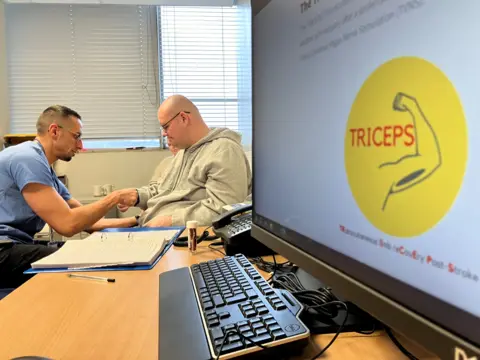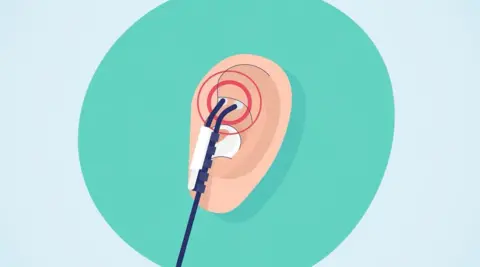Isn't your competent? doctor already using non-invasive vagus nerve stimulation for your recovery? Oh, but you don't have a functioning stroke doctor, do you?
Non-invasive VNS approach could enhance post-stroke recovery outcomes August 2023
vagus nerve (67 posts to July 2012)
vagus nerve stimulation (1 post to February 2023)
paired vagus nerve stimulation (2 posts to April 2022)
£2m electrical earpiece trial for stroke patients
 Tom Ingall / BBC
Tom Ingall / BBCA new treatment for the arm weakness suffered by many stroke patients is to undergo a trial in Sheffield.
The £2m trial, dubbed Triceps, will test whether a device which delivers electrical pulses to the brain via an earpiece helps people regain strength.
It is being led by researchers from Sheffield Teaching Hospitals NHS Foundation Trust and the University of Sheffield.
Prof Arshad Majid, who is leading the project, said they were “really excited” by it.
More than 100,000 people in the UK have a stroke every year.
About a third of survivors are left with permanent arm weakness, limiting their ability to carry out everyday activities.
The treatment involves stimulating a key nerve called the vagus nerve, using a wearable device which connects to a wired earpiece.
Prof Majid said: "In a very small preliminary trial, we showed that gently ‘tickling’ a nerve at the ear using mild electrical pulses improved arm and hand weakness after stroke when used in conjunction with stroke rehabilitation therapy."
 TRICEPS
TRICEPSHe said this initial trial had involved electrical stimulators being surgically implanted into participants' chests.
Prof Majid, a consultant neurologist at the hospital trust and professor of cerebrovascular neurology at the university, said the new trial aimed to establish whether the treatment could be delivered "without the need for surgery".
Far more people could benefit from the treatment if it could be self-administered at home, the researchers said.
Craig Corke, 52, of Chapeltown, Sheffield, was one of those who had a device implanted in the original study.
He said he had seen a “huge improvement” in his hand and arm function.
'Phenomenal' result
Mr Corke suffered a stroke in April 2017 and was in hospital for three months.
The IT worker, who has since returned to work, said: “I’d had a stroke in the night – my wife woke me up and I was mumbling, my brain had gone.”
He told BBC Look North his arm was left "like a dead weight".
Mr Corke took part in the preliminary trial the following year and said the result of the nerve therapy was "phenomenal".
He said: "It let me get back to my life. Before, I was sat at home watching telly."
Up to 243 patients from 15 UK stroke centres are set to be enrolled into the trial over the next two years.
It will also involve researchers from the University of Nottingham and the University of Glasgow, alongside the University of Sheffield’s Clinical Trial Research Unit.
Follow BBC Yorkshire on Facebook, X (formerly Twitter) and Instagram. Send your story ideas to yorkslincs.news@bbc.co.uk.
No comments:
Post a Comment